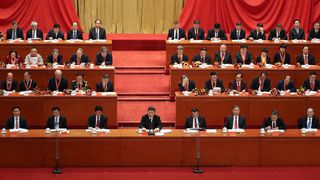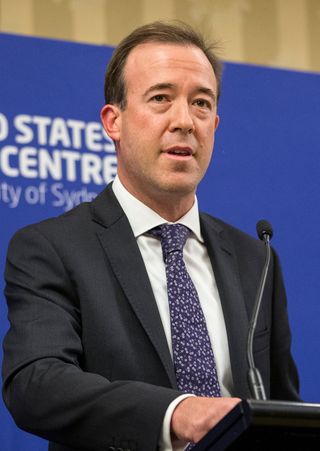It is now an article of faith that coronavirus has intensified existing strategic trends in world politics.
Chief among these has been the "return" of nationalism.
The globe’s most urgent issue is being tackled almost exclusively on a national basis.
But it was not supposed to be like this.
Thirty years ago the conventional wisdom across much of the Western world was that nationalism was no longer needed. The circumstances that gave rise to it had passed. A new post-nationalist era had arrived.
A world emerging from the Cold War was being transformed into a "transnational" nirvana: national boundaries were to become obsolete, old hatreds overcome, jealous rivalries put aside. Supra-national institutions such as the United Nations and the European Union were to finally have their moment in the sun.
For Australia, as for others, this new wave of nationalist fervour has brought acute strategic challenges. But like other US regional allies and partners, Australia finds that two of the chilliest nationalist winds blow in from different directions.
Now, however, there is talk of a "new nationalism". Before the coming of the pandemic, an editorial in Foreign Affairs magazine opined that this nationalist resurgence was "largely unpredicted".
Yet the obituaries for nationalism were always premature. The bloodshed associated with the break-up of the former Yugoslavia, along with the flaring of nationalist movements elsewhere, should have given pause to those dismissing the nation as obsolete.
For Australia, as for others, this new wave of nationalist fervour has brought acute strategic challenges. But like other US regional allies and partners, Australia finds that two of the chilliest nationalist winds blow in from different directions.
Old world order won't return
Its great power ally is led by a President who doesn’t believe in America’s special providence. Making America "great again" has only ever signified Trump’s determination to get his way in the world, particularly on trade.
In other areas, so visibly manifest in the rolling domestic turmoil of recent months, Trump gleefully rubs the gloss off American altruism. There is surely no more wistful talk of his presidency as an "aberration". He rode to power on, then exploited, an array of underlying social, cultural and economic grievances that will also outlast him.
Sensing a distracted America, but drawing on "5000 years of continuous history", China’s President Xi Jinping has clothed much of his domestic and foreign policy agenda in the garb of an assertive Chinese exceptionalism.
Sensing a distracted America, but drawing on "5000 years of continuous history", China’s President Xi Jinping has clothed much of his domestic and foreign policy agenda in the garb of an assertive Chinese exceptionalism.
Among other manifestations, it is seen in his militarisation of the South China Sea and heard in the rhetorical belligerence of "wolf-warrior" diplomats. Whilst Marxist philosophy may still shape state ritual, party leaders project themselves as nationalists. The result is an anti-Chinese feeling stirred up across Asia, Europe, the US and here. Now the question is whether this great power nationalism leads Beijing down the path of hubristic risk-taking.
The confluence of these two factors helps explain why the strategic debate in Australia has tended to get trapped inside a US/China prism. Ongoing doubts over the United States’ staying power in Asia only feed rising alarm about China’s ultimate intentions.
Just as Australia has been trying to articulate a framework within which it can try to manage an increasingly fraught China relationship, Washington, despite its best efforts to the contrary, has struggled to assuage allied concerns in the region. That means long-standing fears of abandonment, still nestled deep in the country’s strategic psychology, merge with anxiety over Australia’s fate in a region that may ultimately be dominated by China.
Concerns over a diminishing sense of US purpose predate Trump. In 2012, then opposition leader Tony Abbott tried to convince Americans they were still "exceptional". The following year, prime minister Julia Gillard reminded Congress that her youth was defined by an America that could "do anything". Later, foreign minister Julie Bishop’s sudden discovery of the "rules based order" carried a pungent whiff of nostalgia for the kind of American leadership that had worked so well for Australia.
Australian political elites have been almost willing America to recover its sense of purpose. Canberra’s diligence in preserving the alliance from the whims of Trump shows the extent to which many believed it was at risk when he came to power.
That it has largely succeeded in that endeavour does not, however, signify consensus in Canberra that the US will maintain strategic pre-eminence in Asia. Alliance sentimentalists will always believe otherwise. They will cling to the belief, much like those in the wake of Britain’s retreat from empire in the 1960s, that the old order can be reimagined. But flip through any recent white paper or defence update and you will struggle to find the kind of language to match Prime Minister Scott Morrison’s White House toast "to the next 100 years of mateship".
In the case of Xi’s nationalism, for all the legitimate concern about its ultimate shape, Australia still has an advantage. From Beijing’s perspective, it is not associated with those Western powers that inflicted the century of humiliation, the memory of which now fuels Chinese confidence.
That is precisely why Canberra should continue to resist any US pressure to join it in an ideological, Cold-War-style crusade against China. Even if a President Biden does not couch it in such terms, he has already spoken of organising "the world to take on China" to stop it "setting the rules".
So for all the difficulty Canberra faces in framing a workable approach to relations with a more assertive China, managing an America where the gap grows between its exceptionalist impulse and its capacity to effect real change will likewise be a pressing challenge for policymakers, no matter who prevails in November.






